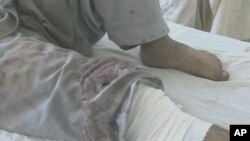Since the terror attacks on the United States almost nine years ago, other attempted attacks have failed. But should one succeed, medical experts say U.S. trauma centers could be strained by a surge of patients needing emergency care.
Since September, 2001, U.S. federal buildings are more secure. Police presence is more visible. And emergency personnel have conducted practice drills in the event of future attacks.
But what if an attack succeeds, like the recent attempted car bombing in New York. U.S. hospitals are not prepared to care for the patients that would flood emergency rooms, says the chief of the shock trauma unit at the Hadassah Medical Center in Jerusalem, Dr. Avi Rivkind.
"It's a problem because when you are used to treat only motor vehicle accidents or gun shot wounds [on] injured patients, it's another game when you are receiving 20 people or 30 people or 50 people together [all at the same time]," said Dr. Rivkind.
In Israel, the most senior doctors do triage. Dr. Rivkind says Americans should copy this practice.
Dr. Rivkind has experienced the effects of a terrorist's bomb in a crowded city and the critical need to be prepared.
"With all the expertise that we have, we are doing drills," he added.
Drills start in medical school. Dr. Rivkind says U.S. hospitals and medical schools need to conduct education and research programs on trauma.
Injuries from a car bomb are very different from other types of injuries. People breathe in the heat from the explosion and they need to receive oxygen quickly, usually through a tube. The process is called intubation.
Dr. Rivkind says in Israel, first responders - emergency medical technicians - are considered part of the trauma team. In Jerusalem, they are equipped with cameras so doctors can quickly see the patients.
"We see it on our computers,” noted Dr. Rivkind. “We now [have] become sophisticated. We see it on our mobiles. And we can speak with them and give them advice to intubate the patient, not to intubate the patient, what to do with the patient on the scene."
The most critical time in treating a patient is in the first 60 minutes after an explosion. Dr. Rivkind's satisfaction comes in seeing patients not only survive, but thrive.
"It's happiness, satisfaction. It's the greatest thing in the world that you can achieve," he added.
Officials in New York and elsewhere are studying the operation of the shock trauma unit at Hadassah Medical Center. But, according to a congressional report, U.S. hospitals have a long way to go.
The report found that many emergency rooms are already performing at capacity, and could not handle a sudden surge of patients.











